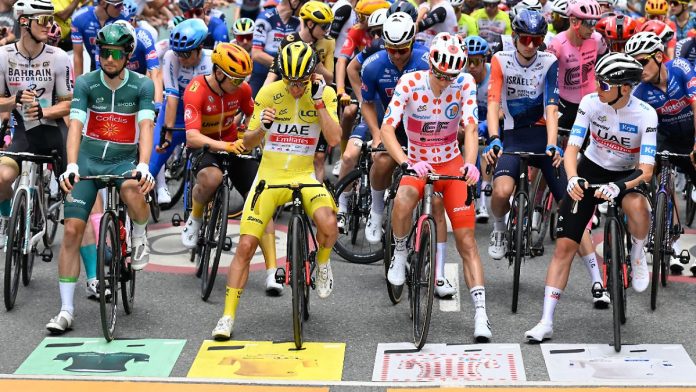Cycling is in danger of being sold out
Dark desert shadows hang over the Tour de France
The influence of government support from the Middle East is also growing in cycling. The differences between the teams are growing noticeably. Bora Hansgrohe team boss Denk is in favor of a 50+1 rule like in football. But he doesn't rule out a sale to foreign investors.
The special anniversary jersey is back in the suitcase at Bora-hansgrohe. On the occasion of their tenth participation in the Tour de France, the German cycling racing team competed in a special outfit at the start of the Grand Loop. The light green material can no longer be worn – the similarity to the green jersey of the top scorer was too great for the organizer ASO.
The jersey was intended as a homage to the Bora success story, to the rise from the second division team to a permanent fixture in the World Tour. However, all goals were not achieved. Team boss Ralph Denk has said goodbye to the dream he formulated a few years ago of one day forming the best team in the world. The economic playing field has changed. New players are dominating the business. “We have arrived where football is now,” said Denk.
More and more money is flowing into professional cycling. Above all, more and more money comes from the Middle East. Top tour favorite Tadej Pogacar is priceless for most teams. He has a long-term and well-paid contract with UAE Emirates. The Kingdom of Bahrain (Bahrain Victorious) has a chance of winning stages. And Saudi Arabia, which pumps billions into world sport, is also increasing its power in the peloton.
Desert scraper Neom will also soon be involved
The desert state is already involved as a co-namesake for the Jayco AlUla team. But the major attack is still to come: According to reports, Saudi Arabia will take over the currently best racing team Jumbo-Visma next season via the Neom City urban development project.
Superstars like Tour defending champion Jonas Vingegaard or all-rounder Wout van Aert could become rolling advertising figures for the Saudis. This will only reinforce the trend of exploding team budgets and widening economic gaps between teams.
Bora-hansgrohe relies on a classic operating company and is financed primarily through sponsorship contracts. In terms of budget, the Raubling racing team is in the middle of the field. The main donors Bora and Hansgrohe have committed themselves until 2027. And then?
Similar discussions in football too
“Cycling is changing, just like football,” said Denk. He does not fundamentally rule out collaboration with donors from the Middle East; after all, DAX companies also have investments in these regions.
“Of course I have to keep my eyes open to see whether we can keep up with the best teams in the medium term with this structure that we are currently set up with,” said Denk: “That’s my job. I would be naïve to say: The Bora business model hansgrohe, that's the way it is now and it'll stay that way for the next ten years.”
In a market that is currently hardly controlled, the world association UCI could counteract this. Denk has “a kind of 50+1 like in German football” in mind. A budget cap or a draft rule like in US sports are also exciting ideas for more equal opportunities among teams. “There are ways to regulate. The question is: Does our world association want that? Or do they want the highest possible team budgets?” said Denk.


